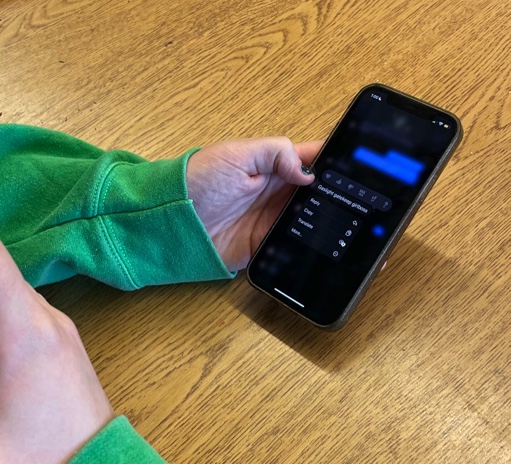
New words are always being created faster than some adults can comprehend. Since Gen Z slang is not not a part of older generations’ vernacular, what exists is a growing divide between younger and older generations.
The slang Gen Z uses is unique and is undoubtedly a reflection of the values this generation holds. Their careless attitude towards others’ bad behavior, striving to be their own person and breaking typical molds that society places on them.
At PVHS, many students’ parents have a difficult time trying to understand words that their teens use on a daily basis. Senior Payten Rascher has had to explain words to her parents numerous times. “My parents don’t always understand what some of the slang I use mean. I definitely have had to teach them what some words mean,” she said. “But now my dad loves trying to make up his own slang to use like ‘straight peeling’.”
This raises the question, what is causing the rapidly evolving slang in the first place?
The rise in technology and online games have changed the way teenagers speak. Platforms like TikTok spread trends internationally incredibly fast — and words are no exception.
This disconnect seems to rise from a lack of adult presence on the social media platforms that teens are predominantly on. Adults tend to gravitate towards using Facebook rather than platforms like TikTok and Instagram. Even if they are on these platforms, the app’s algorithm might be taking older users to a completely different side of the internet.
The changes in the way teenagers speak has shifted to accommodate conversations that are flowing and quick. Phrases like “This is gas!” have replaced “This is so good” and shortened words such as GOAT (greatest of all time) and W (win) are frequently used on social media.
As a father, PVHS sociology and American government teacher Trever Zahn has seen the evolution of modern slang. “It is always interesting to see how kids approach language. And how things are continuously ‘re-invented’ to break from what is considered the ‘norm’ for society, until those terms are assimilated into mainstream culture and then it’s up to the next group of kids to ‘break the mold,’” he said.
Due to developers wanting to curate content for their audiences, they tend to create an algorithm based on what the user responds positively to. If a user likes a person dancing on TikTok, they will be more likely to see more of those videos in the future. If a user likes an athlete’s pictures on Instagram, more of those athletes or similar people will pop up to fit that individual’s interests. Even an individual’s best friend might have a different feed than themselves. Between parents and children, this difference is even more dramatic.
There is also the belief that many kids are learning slang so quickly due to that. Social media moves so quickly that teenagers catch on to new slang fast.
Zahn also agreed that social media had had an impact on the students he has taught over the years. “Social media, at times, demands that kids stay up to speed on what is being said just to make sense of what’s going on and not embarrass themselves by not understanding the terms (FOMO),” he continued.
From the technology that we rely on day to day, the goals we have as a generation and the values we hold, slang is a reflection of these differences. It can be confusing for adults now to learn GenZ slang, but it is something everyone has experienced and will continue happening as people grow and have kids.








